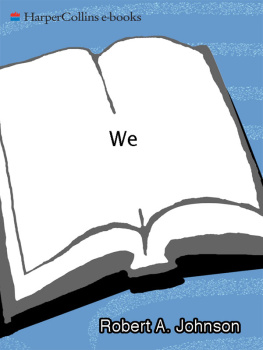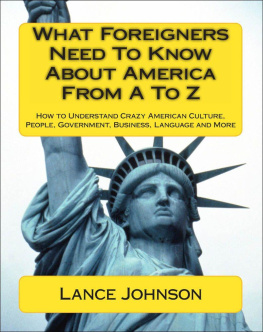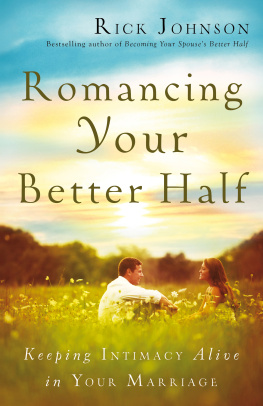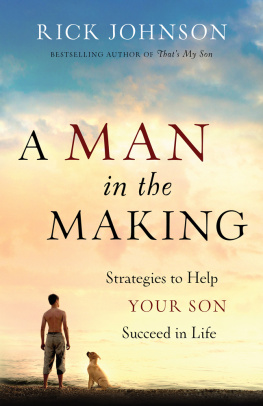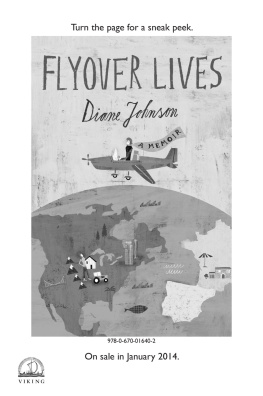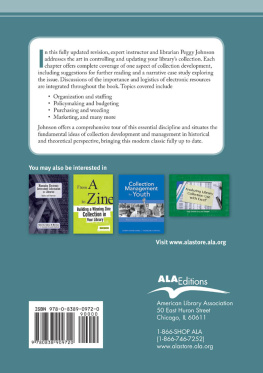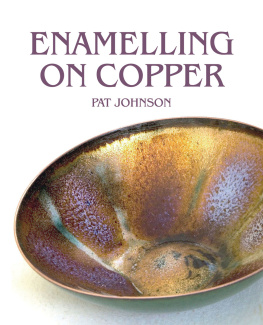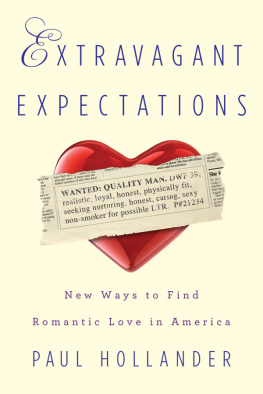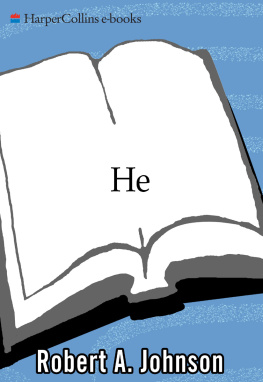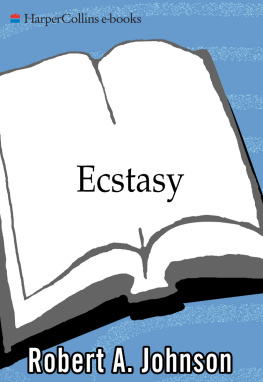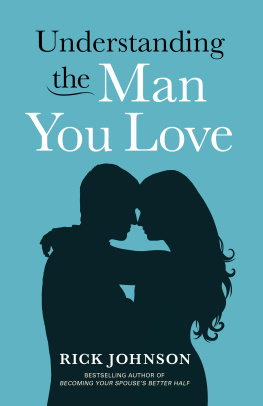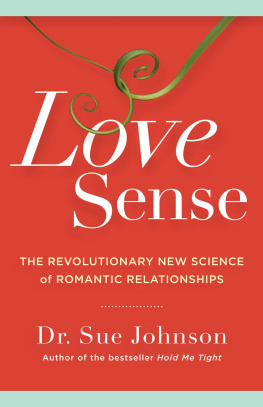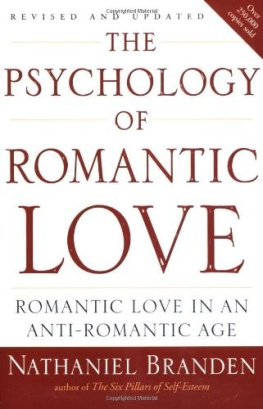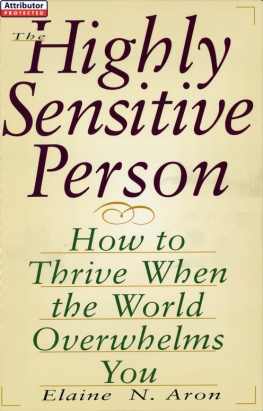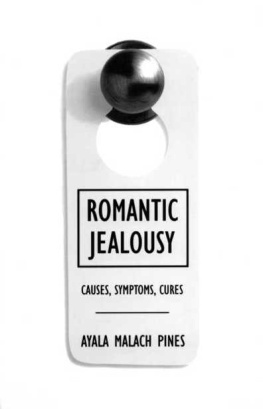Johnson - We: understanding the psychology of romantic love
Here you can read online Johnson - We: understanding the psychology of romantic love full text of the book (entire story) in english for free. Download pdf and epub, get meaning, cover and reviews about this ebook. City: San Francisco, year: 2013;1999, publisher: HarperCollins;HarperSan Francisco, genre: Romance novel. Description of the work, (preface) as well as reviews are available. Best literature library LitArk.com created for fans of good reading and offers a wide selection of genres:
Romance novel
Science fiction
Adventure
Detective
Science
History
Home and family
Prose
Art
Politics
Computer
Non-fiction
Religion
Business
Children
Humor
Choose a favorite category and find really read worthwhile books. Enjoy immersion in the world of imagination, feel the emotions of the characters or learn something new for yourself, make an fascinating discovery.
- Book:We: understanding the psychology of romantic love
- Author:
- Publisher:HarperCollins;HarperSan Francisco
- Genre:
- Year:2013;1999
- City:San Francisco
- Rating:4 / 5
- Favourites:Add to favourites
- Your mark:
- 80
- 1
- 2
- 3
- 4
- 5
We: understanding the psychology of romantic love: summary, description and annotation
We offer to read an annotation, description, summary or preface (depends on what the author of the book "We: understanding the psychology of romantic love" wrote himself). If you haven't found the necessary information about the book — write in the comments, we will try to find it.
Provides an illuminating explanation of the origins and meaning of romantic love and shows how a proper understanding of its psychological dynamics can revitalize our most important relationships.
We: understanding the psychology of romantic love — read online for free the complete book (whole text) full work
Below is the text of the book, divided by pages. System saving the place of the last page read, allows you to conveniently read the book "We: understanding the psychology of romantic love" online for free, without having to search again every time where you left off. Put a bookmark, and you can go to the page where you finished reading at any time.
Font size:
Interval:
Bookmark:

How Tristan Was Born and Grew Up to Be a Great Knight
Blanchefleur
The Child of Sadness
Islands of Consciousness, Seas of God
The Sword and the Harp
How Tristan Was Conquered by the Wine of Love
Approaching the Wine
The Wine of Herbs
Iseult the Fair
The Love Potion in History
Guile and Force
How Tristan and Iseult Wandered in the Enchanted Orchard
The Queen of the Inner World
Deceit Beneath the Pine
The Fourth Year of Morois
How Tristan Found Iseult of the White Hands and How Love and Death at Last Were Mixed
Puzzles and Paradoxes
Iseult of the Earth
Suffering and Death
Iseult-Maya: The Dance of Illusion
The White Bison Spirit Woman
The Dream of the Bell of the Holy Virgin
Of Human Love
He: Understanding Masculine Psychology
She: Understanding Feminine Psychology
Quotations from The Romance of Tristan and Isolde , as retold by Joseph Bdier and translated by Hilaire Belloc and Paul Rosenfeld, are used by permission of Pantheon Books, Inc., copyright 1945, and George Allen & Unwin (England).
WE: UNDERSTANDING THE PSYCHOLOGY OF ROMANTIC LOVE . Copyright 1983 by Robert A. Johnson. All rights reserved under International and Pan-American Copyright Conventions. By payment of the required fees, you have been granted the non-exclusive, non-transferable right to access and read the text of this ebook on-screen. No part of this text may be reproduced, transmitted, down-loaded, decompiled, reverse engineered, or stored in or introduced into any information storage and retrieval system, in any form or by any means, whether electronic or mechanical, now known or hereinafter invented, without the express written permission of HarperCollins ebooks.
FIRST PAPERBACK EDITION
Library of Congress Cataloging in Publication Data
Johnson, Robert A., 1921
We, understanding the psychology of romantic love.
Bibliography: p.
I. Love. 2. Bdier, Jospeh 1864-1938. The romance of Tristan and Iseult. 3. Jung, C. G. (Carl Gustav), 18751961.
BF575.L8J63 1983 152.4 83.47725
ISBN 0-06-250435-5
ISBN 0-06-250436-3 (pbk.)
EPub Edition FEBRUARY 2013 ISBN: 9780061960031
05 RRD H 50 49 48 47 46 45 44 43
Translation of the Myth
This work is a Jungian interpretation of Tristan and Iseult that focuses on the symbols in the myth as sources of psychological insight. It is not intended to be a scholarly study of the myth as literature. Therefore, in order to maintain the flow of narrative and commentary, I have avoided footnote references throughout the text of the myth. Scholars and students of medieval literature will already know the sources of the material, and others would only be distracted from the real purpose of the book by a pretense of scholarly documentation.
Some readers may wish to read the myth in its entirety before returning to my commentary, contained in the chapters following each Narrative section. I have adapted the myth mainly from the famous Bdier compilation of the turn of the century, translated into English by Hilaire Belloc and Paul Rosenfeld. Of necessity I have condensed the material, but in many places where condensation would have bled the story of its energy and power, I have quoted both dialogue and narrative directly from the brilliant Belloc/Rosenfeld translation. (Such quotations are set off in italic type.) An example in point is the last scene of the story, in which Queen Iseult, landing from her ship, dashes to find Tristan: She went up to the palace, following the way, and her cloak was random and wild . Thus begins one of the most beautiful passages ever rendered into English.
Whether scholar or layperson, all should read this marvelous translation in its entirety. It is a rare work of art, for it retains the magnificent simplicity and poetic imagery of archaic English but avoids the self-conscious, flowery affectations that bedevil most such efforts.
I have departed from Monsieur Bdiers version of the myth in only one significant detail: I take from Broul, the first poet to tell the tale of Tristan, the period of three years that the love potion wields its magic power over the lovers. I feel that Brouls version is closer to the archetypal soil, so to speak, from which the myth first grew.
Women will find, in the story of Tristan and Iseult, a vivid symbolic picture of the huge forces at work in all of us, both men and women, when we are caught up in the experience of romantic love.
The myth not only records the dynamics of romantic love in the male psyche, it also reflects the fate of the feminine in our culture; it shows how the feminine values of feeling, relatedness, and soul consciousness have been virtually driven out of our culture by our patriarchal mentality. One of the most important insights in the myth for women is the degree to which most men unconsciously search for their lost feminine side, for the feminine values in life, and attempt to find their unlived feminine side through woman.
But it is not only men who have accepted the patriarchal version of reality. Women also have been taught to idealize masculine values at the expense of the feminine side of life. Many women have spent their lives in a constant feeling of inferiority because they felt that to be feminine was second best. Women have been trained that only masculine activities, thinking, power, and achieving have any real value. Thus Western woman finds herself in the same psychological dilemma as Western man: developing a one-sided, competitive mastery of the masculine qualities at the expense of her feminine side.
Although this mythical evocation of romantic love is told from a mans standpoint and seen through a mans eyes, women will find much of their own experience in it. But a woman should bear in mind that the myth does not always necessarily reflect a womans psychology or a womans special way of experiencing romantic love. There are womens myths, such as Eros and Psyche (for which see my book She ), that present a more exact picture of womans inner structure.
The psychological makeups of men and women are distinct. If we tried fully to explain a womans psychology through a mans myth, it would inevitably give a distorted view of her structure. This is especially true in romantic love, for a womans feeling side develops differently than a mans, and her experience of relationship has subtle nuances that men do not experience in the same way.
Most women spend a tremendous part of their energy in efforts to make a loving relationship with a man and to deal with his seemingly incomprehensible feelings, ideas, and reactions. By making her own journey with Tristan and Iseult, she will understand better the Tristan in her life, and how to draw out the best in him. But also, and of equal importance, she will have a clearer view of her own unknown self.
Romantic love is the single greatest energy system in the Western psyche. In our culture it has supplanted religion as the arena in which men and women seek meaning, transcendence, wholeness, and ecstasy.
As a mass phenomenon, romantic love is peculiar to the West. We are so accustomed to living with the beliefs and assumptions of romantic love that we think it is the only form of love on which marriage or love relationships can be based. We think it is the only true love. But there is much that we can learn from the East about this. In Eastern cultures, like those of India or Japan, we find that married couples love each other with great warmth, often with a stability and devotion that puts us to shame. But their love is not romantic love as we know it. They dont impose the same ideals on their relationships, nor do they impose such impossible demands and expectations on each other as we do.
Font size:
Interval:
Bookmark:
Similar books «We: understanding the psychology of romantic love»
Look at similar books to We: understanding the psychology of romantic love. We have selected literature similar in name and meaning in the hope of providing readers with more options to find new, interesting, not yet read works.
Discussion, reviews of the book We: understanding the psychology of romantic love and just readers' own opinions. Leave your comments, write what you think about the work, its meaning or the main characters. Specify what exactly you liked and what you didn't like, and why you think so.

